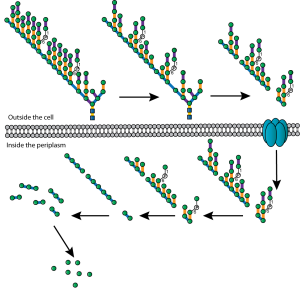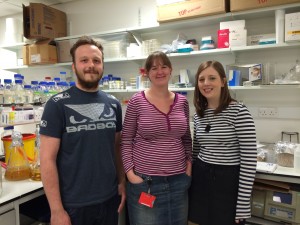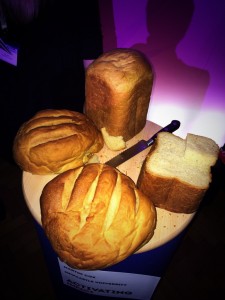The diverse organisms that live in our gut, collectively termed the gut microbiota, can have a major impact on our health. A new paper from Prof. Harry Gilbert’s lab in ICaMB, published today in Nature, shows that one member of our gut microflora uses a ’selfish’ mechanism to degrade a component of the cell wall of the yeast in our diet.
By Drs. Elisabeth Lowe and Fiona Cuskin.
Have you over-indulged this Christmas? One too many ales, or too many turkey sandwiches?
The good news is that, while your waist line may be expanding and you may be feeling a little the worse for wear, the organisms of your gut microbiota are thriving!
Some of the bacteria in the human gut, called Bacteroides, can break down the complex carbohydrates in our diet into simple sugars, which they use for energy.
Our work, published in Nature today, shows that one of these bacteria can also break down some of the carbohydrate cell wall of yeasts, called mannan, a polymer of mannose. This includes mannan from Saccharomyces cerevisiae (Baker’s yeast), and the pathogenic gut fungus, Candida albicans. The current understanding of polysaccharide digestion by gut bacteria suggests a cooperative environment, in which break-down products are shared between different members of the microbiota. However our data shows that this species (Bacteroides thetaiotaomicron) is ‘selfish’ when it degrades mannan, and doesn’t share any of the digestion products with other bacteria.
To achieve this selfish degradation, the large and multiply-branched mannan structure undergoes only very limited degradation in the extracellular space (see figure). The resulting processed mannan fragments are then imported into the Bacteroides periplasmic space, where they are further degraded by a suite of glycoside hydrolase enzymes to yield the sugar mannose. Achieving complete breakdown within the periplasm prevents the mannose from being shared with competing bacteria.
This selfish approach to mannan utilisation could offer the opportunity to design bespoke prebiotics targeted to a specific bacterial population within the gut. Food products containing yeast mannan would be expected to promote growth of B. thetaiotamicron, whereas other complex polysaccharides may specifically promote other members of the microbiota.

Complex polysaccharide mannan is sequentially degraded by a ‘selfish’ mechanism to yield periplasmic mannose.
A number of inflammatory bowel diseases such as Crohn’s disease are associated with intolerance to yeast, and particularly cell wall polysaccharides, and have also been linked to low levels of Bacteroides species in the gut. Our work provides a potential mechanism for how Bacteroides might be able to influence the effect of yeast on patients with Crohn’s disease, and in fact a drug named Thetanix (which is a live formulation of Bacteroides thetaiotaomicron) has been licensed for treatment of paediatric Crohn’s disease in the USA.

Researchers Max Temple, Lis Lowe and Fiona Cuskin of the Gilbert lab.
Yeast is commonly in our diet in the form of some of our favourite things: bread, beer, wine and fermented food products. So it may be dry January but if your willpower fails and you succumb to an alcoholic beverage, then make sure it’s an unfiltered one with plenty of yeast!
This research in the Gilbert lab was funded by the Wellcome Trust and the European Research Council.
Links:
Nature article: http://www.nature.com/nature/journal/v517/n7533/full/nature13995.html
Press release: http://www.ncl.ac.uk/press.office/press.release/item/beer-and-bread-yeast-eating-bacteria-aid-human-health
Gilbert Lab: http://www.ncl.ac.uk/camb/staff/profile/harry.gilbert




